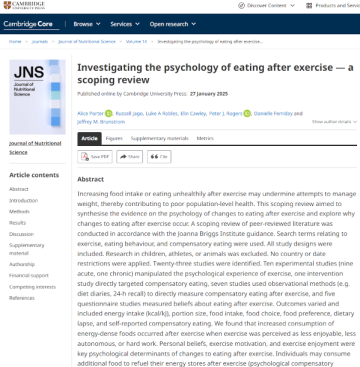Psychological factors affecting eating after exercise: A scoping review
Theme Diet and physical activity
Workstream Population diet and physical activity
Status: This project is complete
The aim of this project was to explore how we can help people reduce their food intake after exercise.
People sometimes eat after being physically active because they see food as a form of reward or think they need to replace the energy they used while exercising. We want to develop an intervention to reduce the amount they eat as this could help them maintain a healthy weight.
Many people believe things about hunger and eating that do not match up with scientific evidence. For example, they report needing to eat between meals as a way of keeping their energy levels up. Our previous research indicates that this could stand in the way of people achieving a healthy weight and maintaining it.
Many people also overestimate the energy they use while physically active. Some might even see exercising as a ‘licence’ to eat additional food or use food as a reward for being active. This is why eating after exercise can potentially undermine the benefits of physical activity for healthy weight maintenance.
Our preliminary work already shows that one way to reduce post-exercise food intake is to use immersive technologies such as virtual reality, which increases the enjoyment of physical activity. We suspect that that this could reduce the ‘licence’ people give themselves to eat more after exercising.
What we found
From our analysis of 23 studies, the researchers propose two broad psychological responses to eating following exercise.
‘Post-exercise psychological compensatory eating’
This is when a person consumes more food than if they hadn’t exercised, because they believe they need to refuel their energy stores. This could be to improve their recovery and performance.
‘Post-exercise licensing’
This describes consuming more food, and particularly unhealthy, energy-dense foods, after exercise. This could be because the person has a negative psychological experience of exercise. Or it could be because they believe exercising permits them to eat unhealthy food, perhaps as a reward.
Comparing studies
The 23 studies covered a range of study designs and measured different outcomes.
The review showed mixed findings across studies. While some of this could be because of different types of study, the researchers conclude that it is also because responses to exercise and eating vary from person to person.
The review also suggests exercise framed as burning lots of calories or fat, or as being hard work led to higher consumption of unhealthy foods.
Future research
In terms of future research, the team found limited evidence on the:
- How prevalent eating more (or less) food after exercise is
- Types of foods consumed
- Factors driving these behaviours, including how many people hold specific post-exercise eating beliefs
What next?
We are planning a series of studies to address this issue, starting with this scoping review to inform future work. Building on this evidence, we plan to design and pilot an intervention that limits the psychological licencing of food intake to maximise the potential benefits of physical activity for healthy weight maintenance.
